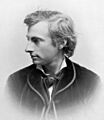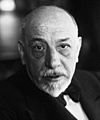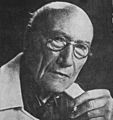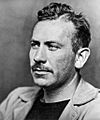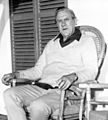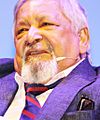List of Nobel laureates in Literature facts for kids
The Nobel Prize in Literature (which in Swedish is called Nobelpriset i litteratur) is a very special award given out every year. It's given by the Swedish Academy to authors who have written amazing books and stories. This prize is one of five big awards created by Alfred Nobel in his will back in 1895. The other Nobel Prizes are for chemistry, physics, peace, and medicine.
The Nobel Foundation helps manage the prize, and the Swedish Academy chooses the winners. Each person who wins gets a shiny medal, a special diploma, and a money prize. The amount of money changes over the years. For example, in 1901, the first winner, Sully Prudhomme, received about 150,782 SEK. That's like getting over 8.8 million SEK today! The award ceremony happens every year in Stockholm on December 10th, which is the day Alfred Nobel passed away.
As of 2024, 121 different people have won the Nobel Prize in Literature. Out of these, 18 winners have been women. This is the second-highest number of women winners for any Nobel Prize, after the Nobel Peace Prize. Most winners, 29 of them, have written in English. French is next with 16 winners, and German with 14. France has had the most Nobel laureates overall.
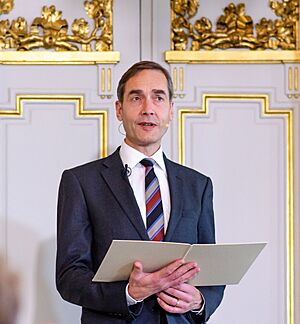
Contents
Who Has Won the Nobel Prize in Literature?
The Nobel Prize in Literature has been awarded to many talented writers from all over the world. Here's a look at some of the early winners and what they were recognized for.
Early Winners: 1901-1920
- Sully Prudhomme (1901): He was a French poet. He won for his poetry that showed deep thoughts, artistic skill, and a mix of feelings and smart ideas.
- Theodor Mommsen (1902): This German writer was a master of historical writing. He won for his huge work, A History of Rome.
- Bjørnstjerne Bjørnson (1903): From Norway, he was honored for his "noble, magnificent, and versatile poetry." His writing was known for its fresh ideas and pure spirit.
- Frédéric Mistral (1904): A French poet, he won for his original and inspiring poetry. His work showed the natural beauty and spirit of his people. He also studied the Provençal language.
- José Echegaray (1904): This Spanish writer was recognized for his many brilliant plays. He brought back the great traditions of Spanish drama in a new and unique way.
- Henryk Sienkiewicz (1905): From Poland, he was awarded for his amazing skills as an epic writer.
- Giosuè Carducci (1906): This Italian poet won for his deep knowledge, critical thinking, and especially for the creative energy and fresh style in his poems.
- Rudyard Kipling (1907): The British author was recognized for his strong observations, creative imagination, and great storytelling talent. He wrote famous works like The Jungle Book.
- Rudolf Christoph Eucken (1908): A German philosopher, he won for his serious search for truth and his clear, strong way of presenting his ideas about an ideal way of life.
- Selma Lagerlöf (1909): From Sweden, she was praised for her high ideals, vivid imagination, and spiritual understanding in her writings. She was the first woman to win the prize.
- Paul von Heyse (1910): This German writer won for his artistic skill and idealism shown throughout his long career as a poet, playwright, and novelist.
- Maurice Maeterlinck (1911): A Belgian writer, he was recognized for his many different literary works, especially his plays. These plays were full of imagination and poetic ideas, often like fairy tales.
- Gerhart Hauptmann (1912): From Germany, he won mainly for his many important and excellent plays.
- Rabindranath Tagore (1913): This Indian writer was awarded for his "profoundly sensitive, fresh and beautiful verse." He shared his poetic thoughts, expressed in English, with the Western world.
- Romain Rolland (1915): A French author, he won for the high ideals in his writing and his kind and truthful way of describing different kinds of people.
- Verner von Heidenstam (1916): From Sweden, he was recognized for being a leading figure in a new era of Swedish literature.
- Karl Adolph Gjellerup (1917): This Danish writer won for his varied and rich poetry, which was inspired by noble ideals.
- Henrik Pontoppidan (1917): Also from Denmark, he was awarded for his real and honest descriptions of life in Denmark at the time.
- Carl Spitteler (1919): A Swiss writer, he won special recognition for his epic poem, Olympian Spring.
- Knut Hamsun (1920): From Norway, he was awarded for his huge work, Growth of the Soil.
Nobel Laureates by Country
The Nobel Prize in Literature has been given to writers from many different countries. Here's a list of countries and how many winners they've had from 1901 to 2024:
- France: 16 winners
- United States: 13 winners
- United Kingdom: 13 winners
- Germany: 9 winners
- Sweden: 8 winners
- Poland: 6 winners
- Spain: 6 winners
- Italy: 6 winners
- Russia/USSR: 5 winners
- Ireland: 4 winners
- Norway: 4 winners
- Denmark: 3 winners
- Austria: 2 winners
- Chile: 2 winners
- Greece: 2 winners
- Japan: 2 winners
- South Africa: 2 winners
- Switzerland: 2 winners
- China: 2 winners
- Australia: 1 winner
- Belarus: 1 winner
- Belgium: 1 winner
- Bulgaria: 1 winner
- Canada: 1 winner
- Colombia: 1 winner
- Czechoslovakia: 1 winner
- Egypt: 1 winner
- Finland: 1 winner
- Guatemala: 1 winner
- Hungary: 1 winner
- Iceland: 1 winner
- India: 1 winner
- Israel: 1 winner
- Mauritius: 1 winner
- Mexico: 1 winner
- Nigeria: 1 winner
- Peru: 1 winner
- Portugal: 1 winner
- Romania: 1 winner
- Saint Lucia: 1 winner
- South Korea: 1 winner
- Tanzania: 1 winner
- Turkey: 1 winner
- Yugoslavia: 1 winner
Nobel Laureates by Language
Writers have won the Nobel Prize in Literature for works written in many different languages. Here are the languages and the number of winners from 1901 to 2024:
- English: 29 winners
- French: 16 winners
- German: 14 winners
- Spanish: 11 winners
- Swedish: 7 winners
- Italian: 6 winners
- Russian: 6 winners
- Polish: 5 winners
- Norwegian: 4 winners
- Danish: 3 winners
- Chinese: 2 winners
- Greek: 2 winners
- Japanese: 2 winners
- Arabic: 1 winner
- Bengali: 1 winner
- Czech: 1 winner
- Finnish: 1 winner
- Hebrew: 1 winner
- Hungarian: 1 winner
- Icelandic: 1 winner
- Korean: 1 winner
- Provençal (Occitan): 1 winner
- Portuguese: 1 winner
- Serbo-Croatian: 1 winner
- Turkish: 1 winner
- Yiddish: 1 winner
Some writers wrote in more than one language. For example, Rabindranath Tagore wrote in Bengali and English, Samuel Beckett wrote in French and English, and Joseph Brodsky wrote poetry in Russian and prose in English.
Nobel Laureates by Gender
The Nobel Prize in Literature has been awarded to both men and women. Here's a look at how many men and women have won in each decade from 1900 to 2029:
- 1900–1909: 9 Male, 1 Female
- 1910–1919: 9 Male, 0 Female
- 1920–1929: 8 Male, 2 Female
- 1930–1939: 8 Male, 1 Female
- 1940–1949: 5 Male, 1 Female
- 1950–1959: 10 Male, 0 Female
- 1960–1969: 10 Male, 1 Female
- 1970–1979: 11 Male, 0 Female
- 1980–1989: 10 Male, 0 Female
- 1990–1999: 7 Male, 3 Female
- 2000–2009: 7 Male, 3 Female
- 2010–2019: 7 Male, 3 Female
- 2020–2029: 2 Male, 3 Female
- Total: 103 Male, 18 Female
Images for kids
See also
 In Spanish: Anexo:Ganadores del Premio Nobel de Literatura para niños
In Spanish: Anexo:Ganadores del Premio Nobel de Literatura para niños
 | Leon Lynch |
 | Milton P. Webster |
 | Ferdinand Smith |


















